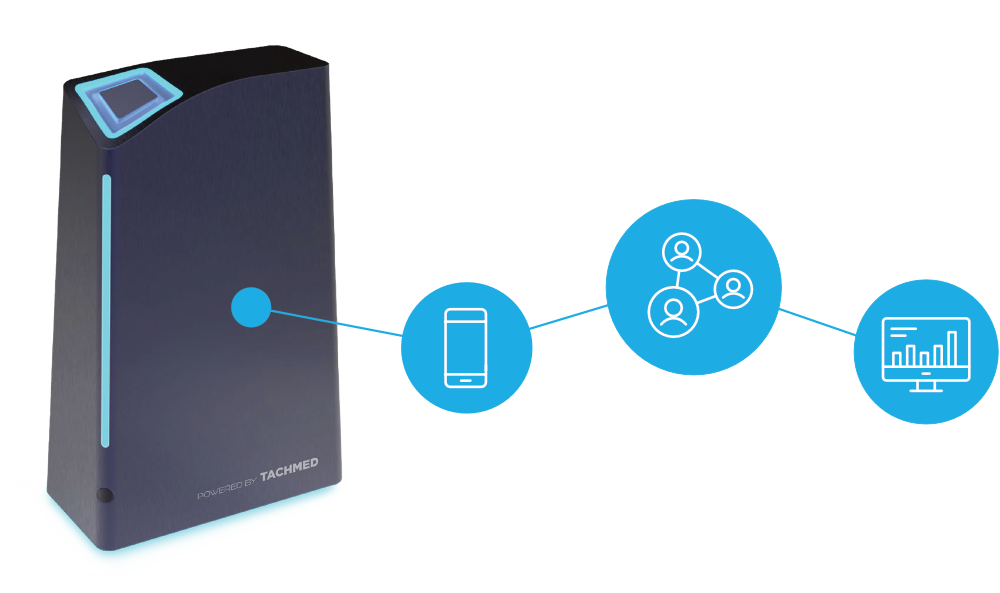Healthcare
done
differently
Better ways with…datatrend analysisdiagnosisinsuranceclinical support
Better ways with…datatrend analysisdiagnosisinsuranceclinical support
When it comes to healthcare, the old ways just aren’t cutting it any more. In a joined-up, digital world, why are so many clinicians and insurers still stuck with the same old approaches to diagnosis, health trends and communication?
It’s our mission to make the step change from ‘ok’ to ‘oh wow’. Fully integrated digital tools harness the power of big data, connect healthcare providers around the globe and ultimately, deliver a better, fairer, faster service to patients.
We understand that when it comes to your family’s health, you want to get answers fast. Our at-home solutions put the power in your hands and wipe out waiting times.
Tachmed’s intuitive devices mean you can self-test without the need for a doctor’s appointment or a delay in getting your results. Your data is instantly delivered to your healthcare practitioner who immediately has the information they need to diagnose or prescribe. Whether you’re monitoring a chronic illness or want to check for viral infection or new conditions, it puts you in control. So if you’re done with waiting for answers, it’s time to do things differently.

Living in the modern, digital world means we all leave a trace of ourselves behind every time we buy a coffee or pay a bill. Imagine if everyone in the world spoke up whenever they caught a new virus or developed a disease.
We’d be able to spot threats such as Covid long before they spread around the world. We’d see if and where disease was on the rise and be able to step in and do something about it. No more sitting back and waiting until it’s too late. Tachmed devices share your completely anonymous data with doctors, so that they can spot these trends in advance. So every time you test, you’re helping healthcare get better – for everyone.
Sometimes it’s the toughest situations that generate the best ideas. That’s what happened when our Founder, Paul Christie, observed the challenges faced by clinicians in Africa.
On such a vast continent, there weren’t enough doctors on the ground to reach remote populations. Thoughts were turning to recruiting clinicians from other continents. Meanwhile, Paul also noticed how rapidly African people were adopting mobile phone technology to do daily tasks. Because they weren’t held back by an outdated landline infrastructure, the shift to mobile was far ahead of European nations. Paul realised that clinicians could now be instantly accessed across continents – but what they couldn’t do was diagnose remotely. It was time for a different approach. Tachmed soon began combining a passion for more democratic, accessible and precise healthcare with the endless possibilities of digital technology.
Tachmed has global stakeholder partnerships with leading universities, tech companies and supra-national organisations. Our pipeline of revolutionary, proprietary technologies for detecting chronic and infectious diseases is changing existing assumptions about how to deliver healthcare. We’re also creating a step-change in how to responsibly collect big data in a fully compliant way, so that we can successfully prepare for future healthcare challenges – ensuring everyone can get the care they deserve.
What do you want to do differently?
Ask about our range of innovations that are transforming the nature of healthcare and let’s see what we can do for you.

Discover our world-class innovation that delivers fast, accurate diagnoses and identifies healthcare trends and threats.

Think of it as your digital health toolbox for health management. Using ground-breaking graphene technology, this intuitive and easy-to-use smart health meter captures biomarkers of diseases, then reports electronically through the digital system to the clinician. It supports a wide range of different chips via a single instrument that can be kept in health hubs or patients’ homes. As well as dramatically improving the rates and accuracy of diagnosis, it also collects the big data we need to transform our approach to future healthcare threats.